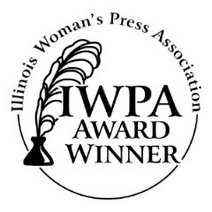
First, some good news:
My book, Reinventing Myself: Memoirs of a Retired Professor, has been awarded first place in the Biography and Autobiography category of the llinois Woman's Press Association's Mate E. Palmer Communications Contest. I will receive the award in May at the IWPA's awards luncheon.
Also, I will be starting a new column for http://www. seniorsgrandcentral/www.eGenerations.com, probably on or about April 15, 2007, as part of a new feature to be called "MyMemoirs." This is a relatively new senior/boomer web site, and I look forward to contributing. Check out that site, especially if you're over 50. Membership is free.
A memoir from the past by a fascinating senior (see cover photo above):
R. Merle Funston was my stepfather, married to my mother, Violet Funston, during the last eight years of his life. During the final two years, while he knew he was dying of emphysema, he told his life story to my mother. She prepared the copy on an old typewriter; then she paid to have it reproduced in the original Courier typewriter font and published in a slim blue paper volume by Bireline Publishing of Newell, Iowa. Mother hurried to finish the book and begged for a preliminary copy she could read to Merle before he died. She said it seemed almost as if he was living to see the book published. A copy arrived in time, and she was able to read it to him. He was pleased, and asked her to read his favorite chapter, the final one, several times. Merle died on May 9, 1983, at the age of 75, just a few days after his book was published.
Merle Funston was born on July 1, 1908, in Hampton, Iowa. In 1912, the family moved to the farm where Merle’s father had been born in Jo Daviess County, near Galena, Illinois, to the neighborhood known as Irish Hollow. Merle’s life revolved about the Winston Tunnel and the Chicago Great Western Railroad.
"When I was a boy I often stood on top of the tunnel facing north. To my left I could see across the Mississippi into Iowa. I could also see the single track of the Chicago Great Western Railroad to the Rice Station just east of Blackjack Road. To the north, I could see the roofs of the buildings on my father’s farm."
The Winston Tunnel, a half-mile long, completed in about 1888, became a lifelong interest for Merle. Many of his memories revolved around the railroad and the tunnel. He remembered U.S. soldiers being stationed at both ends of the tunnel for about three months during World War I to protect the soldiers and supplies transported through it. The soldiers bought eggs, milk, and homemade butter from Merle’s mother. He remembered that when an uncle and some friends cut down a neighbor’s "bee tree" to steal the honey, they timed the tree’s fall so that the noise from a passing Chicago Great Western train passing the farm would cover the sound of the falling tree.
The last train passed through the Winston Tunnel in 1970. A few years later, Merle supported a group trying to establish a "Great Western Nature Trail" on the abandoned railroad right of way. He wanted the "atmosphere, the memories, and the beauty of the area" to be preserved. However, neighborhood property owners banded together to buy the land and defeat the nature trail plan.
This book reminds us of how much Midwestern life has changed. While most boys living in Irish Hollow at the time did not attend high school, Merle decided to do so as long as he could ride his pony, Bird, to Galena High School. He started out about six a.m. and "parked" Bird in a barn behind the grocery store. After high school, he worked for the Chicago Great Western Railroad for about ten years, and later became a farmer and cabinet maker near Stockton, Illinois, where he was living at the time of his death. He married and had a son, and was widowed in 1972. He married my mother in 1975.
In his conclusion, Merle states, "A ski resort, eating place, golf course, and fancy subdivision occupy the land where my uncle and I hauled walnut logs. The boys of Irish Hollow are probably watching television instead of listening to stories told by their elders or watching trains going in and out of Winston Tunnel." In fact, the tunnel was fenced off, the openings bulldozed shut in 1973, and parts of it collapsed later.
I did not know Merle Funston very well, but he was a nice, kind man whom my mother described as "always cheerful, always laughing, always telling his stories." Thank you, Merle, for proving that all of us, whatever our life circumstances or lack of fame, have interesting stories that need to be recorded, interesting lives that should be remembered.
This book is not generally available any longer, except possibly in local history collections in the Galena, Illinois, area.
Copyright 2007 by Marlys Marshall Styne


















2 comments:
Congratulations, Marlys! Your book was inspiring, and I'm glad to see it recognized. I look forward to your new column--though I am committed to following this blog!
Thanks, Pat. I have quite a few unanimous readers from time to time, but not many who bother to comment. I really welcome comments, both positive and negative. And why don't you start your own blog? It's free and it's relatively easy.
Post a Comment